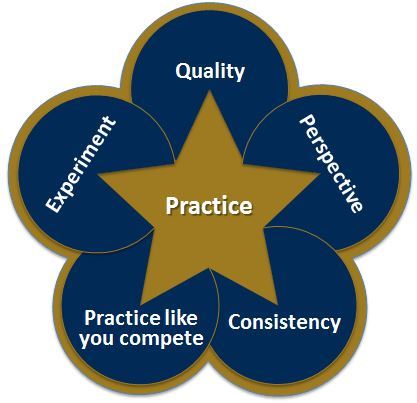In his Prime Performance System, Dr. Jim Taylor* teaches that practice is the foundation of success in athletics: it’s what you do that determines whether you do or do not achieve your goals. While the spiritual life is not an athletic contest, there are some interesting parallels that arise.
- Practice like you compete. Simply put, practice has little real significance unless it is aimed at a goal – the competition that tests our abilities. We do not “compete” in the spiritual life, however, our spiritual “practice” must have a higher purpose than just our immediate well-being. It must be future oriented – namely that we undertake spiritual disciplines so that we are fit when spiritual challenges encounter us. For example, if we daily practice ways to “depend on God” even when it seems we don’t “need” God, when the day comes (a serious illness, the loss of a loved one, a stressful family situation), we naturally and almost automatically recognize God’s presence and the inner strength that a life with God provides.

- Consistency is what often separates great athletes from good athletes. Regular routines in practice develop what some call “muscle memory.” This is true in many areas of our lives. Take the simple act of brushing your teeth. Do you make every movement intentionally? Or has the daily routine of moving the brush inside your mouth made the process from beginning to end, nearly automatic? I am sure you think of other things when your brush your teeth. We need to develop our “spiritual muscles” in a similar way – by consistent repetition we can raise our spiritual awareness from the mere task at hand to a more transcendent purpose.
- Experiment with new things. Dr. Taylor teaches that the only way to improve as an athlete is to experiment and try new things. But he also recognizes that improvement is often difficult: it takes time and is often frustrating. Experimenting can makes us uncomfortable because new things are unfamiliar. At first, they don’t feel good, and sometime they don’t seem to work. Yet, despite these obstacles, to achieve the higher purposes for which we strive in the spiritual life, we must be open to try new things, physically, emotionally, mentally, and with the varied traditions we have inherited. Only through experimentation can we find that mixture that will lead us to even greater awareness of the power of the Spirit in our lives.
- Maintain a healthy perspective. We live in a culture in which we are led to believe that everything can be accomplished quickly and with little or no effort. But reality is just the opposite. Often we too late discover that anything in life worth doing takes commitment, time, and energy. If we buy into the ‘fast and now’ perspective, we may be doomed to an experience of the spiritual life that is filled with frustration and dissatisfaction. Consequently, we soon come face-to-face with the normal challenges of life noting little or no growth or less real meaning and purpose in our lives.
- Seek to maximize the quality of spiritual practice. The quality of any specific practice will have a great impact on how we develop as a disciple of Christ and the difference that makes in our daily lives. Specifically, it enables us to get the most out of a spiritual practice, thereby moving us closer to spiritual growth. Quality practice enables us to ingrain effective physical, spiritual, and mental skills and habits that can prepare us well for the challenges Christian disciples face in our modern world. Our goal, then, must be to engage in “high-quality” spiritual practices every day. We can find these “high-quality” practices in the teachings of spiritual masters through the ages – or by following the advice of others who have made the journey before us.
So, as we launch into our Lenten pilgrimage and experiment with new spiritual practices, we should remember a few things: (1) the goal of spiritual practices is never the practice itself, but the higher value of intimacy with God; (2) many practices become richer and deeper when we experience them with others, rather than by ourselves; and, (3) like any other discipline, the spiritual disciplines don’t come easy. So don’t be discouraged. Practice, and don’t be discouraged.
_____
*Dr. Jim Taylor, “
Practice is the Foundation of Athletic Success” The Huffington Post
04/29/2016, updated Dec 06, 2017.
https://www.huffingtonpost.com/dr-jim-taylor/practice-is-the-foundatio_b_9806606.html
Source: Rector’s Blog
